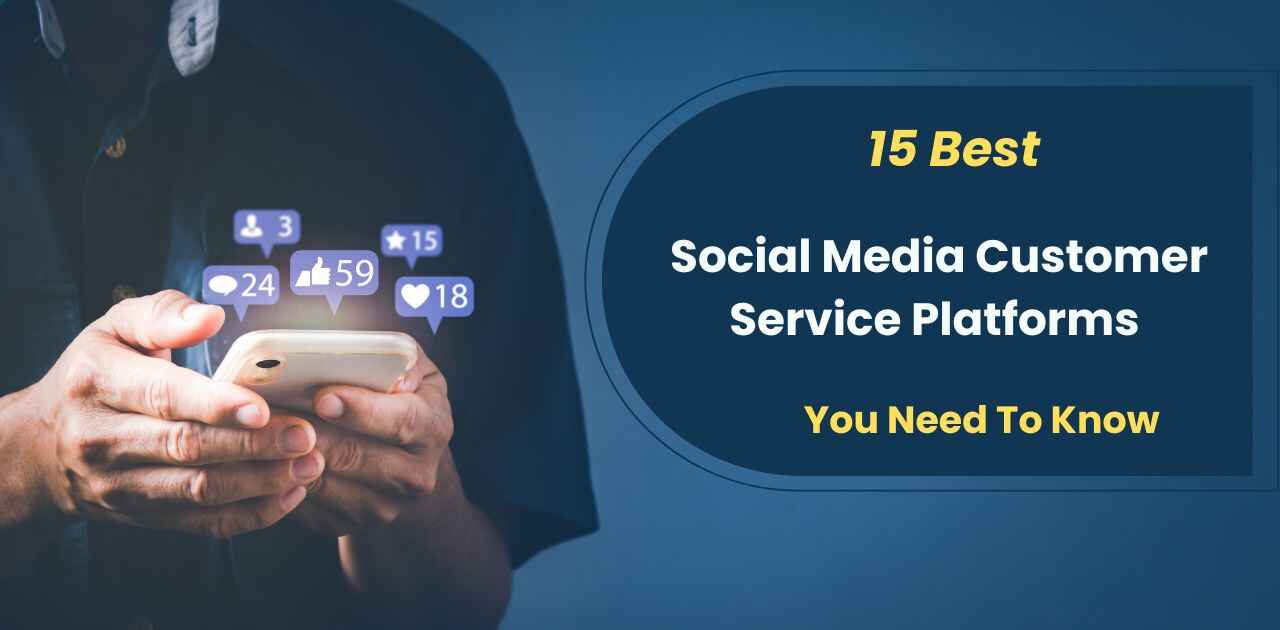Social media has become a vital channel for customer service. These days, customers expect quick answers and help through their favorite platforms. But managing customer questions across multiple social networks can be tricky.
That’s where social media customer service platforms come in handy. These tools help businesses handle their social customer care more smoothly, making it easier to respond quickly and effectively.
In this article, we’ll explore the 15 best social media customer service platforms you should know about. These tools can help you improve response times, keep track of customer issues, and provide better support overall. Let’s dive in and see which platforms might work best for your business.
What is Social Media Customer Service Platform?
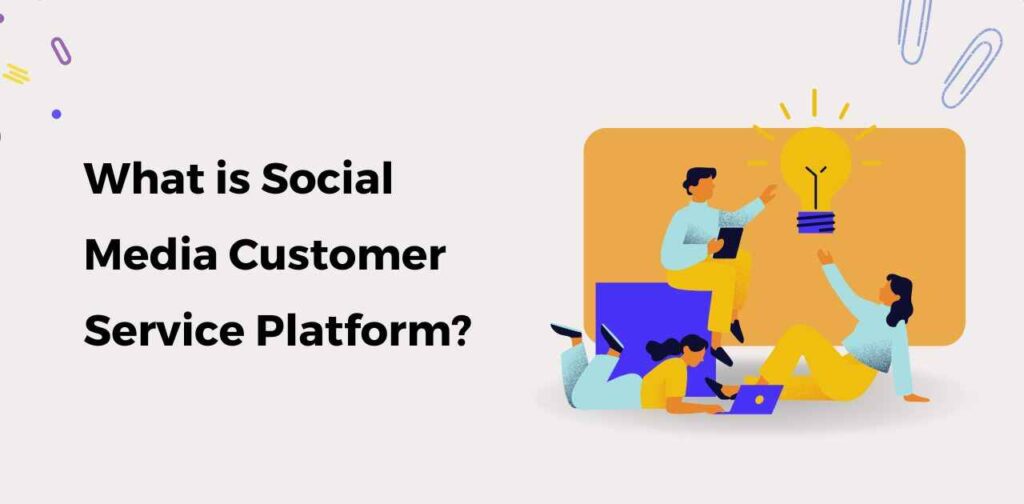
In today’s digital age, a social media customer service platform is your secret weapon for managing customer interactions across various social networks. It’s like having a super-smart assistant that helps you catch, organize, and respond to customer queries, complaints, and praise all in one place. These platforms are designed to make your life easier and your customers happier by streamlining your social media support efforts.
Definition and purpose
Ever feel like you’re juggling a dozen balls while riding a unicycle when it comes to managing customer queries on social media? That’s where a social media customer service platform comes in. It’s like having a super-smart assistant that helps you catch all those balls without falling off your unicycle.
In simple terms, it’s a tool that helps businesses manage and respond to customer inquiries across various social networks. Think of it as your command center for all things customer service on social media. Its purpose? To make your life easier and your customers happier.
Popular platforms used for social media customer service
When it comes to where customers are reaching out, some platforms are hotter than others. Facebook Messenger is like the popular kid in school everyone’s using it. In fact, it sees over 130 billion messages each month! Instagram is not far behind, especially with younger crowds.
But don’t forget about the new kid on the block TikTok. It’s quickly becoming a go-to for Gen Z when they want to reach out to brands. And let’s not overlook the professional network LinkedIn, where B2B companies are finding more and more customers seeking support.
Benefits of Using a Social Media Customer Service Platform
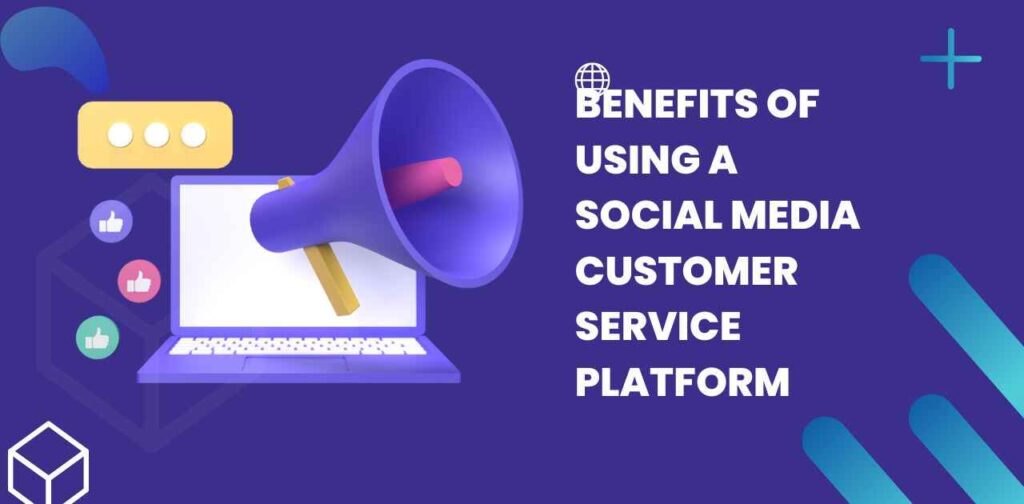
Imagine being able to respond to customers in minutes, no matter which social platform they’re using. That’s just one of the many perks of using a social media customer service platform. These tools can skyrocket your customer satisfaction rates, streamline your team’s workflow, and give you valuable insights into your customers’ needs and behaviors. It’s like having a customer service superpower that helps you turn social media challenges into opportunities for building stronger customer relationships.
Enhanced customer satisfaction
Suppose: A customer tweets about an issue with your product. Within minutes, they get a personalized response addressing their concern. How do you think they’d feel? Pretty darn good, right?
That’s the power of using a social media customer service platform. It helps you respond faster and more effectively, leading to happier customers. And happy customers are loyal customers. In fact, studies show that when customers receive good service on social media, they’re more likely to recommend the brand to others. It’s like turning your customers into your personal cheerleading squad!
Streamlined communication and organization
Remember that feeling of dread when you open your social media accounts and see a flood of unread messages? With a good customer service platform, that feeling becomes a thing of the past.
These platforms help you organize all your messages in one place, regardless of which social network they came from. It’s like having a super-organized digital filing cabinet. You can prioritize urgent messages, assign tasks to team members, and track the progress of each query. No more messages slipping through the cracks!
Increased efficiency and productivity
Let’s face it, time is money. And social media customer service platforms are all about saving you time. How? By automating repetitive tasks and providing quick access to customer information.
For instance, chatbots can handle simple queries 24/7, freeing up your human agents for more complex issues. And with all customer data at your fingertips, you don’t have to scramble for information when responding to a query. It’s like having a cheat sheet for every customer interaction!
Top Features to Look for in Social Media Customer Service Software
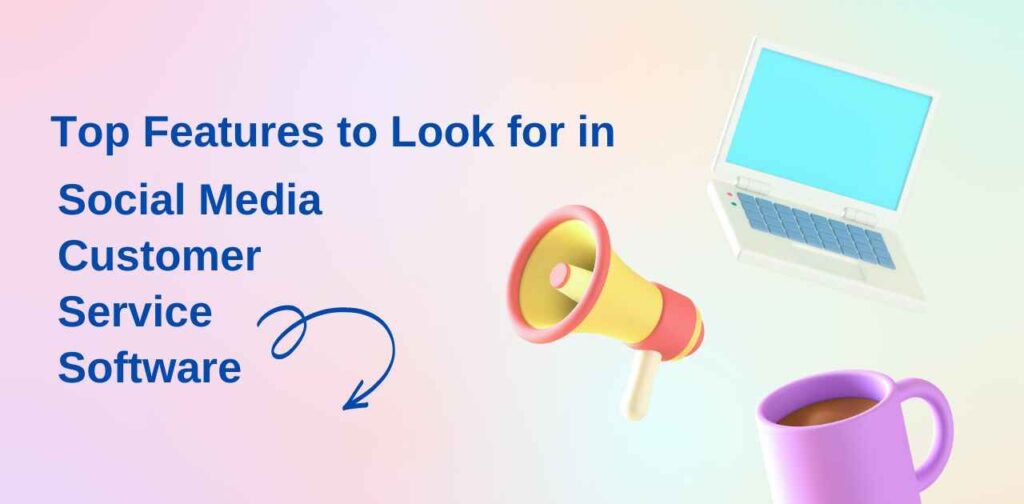
When shopping for a social media customer service platform, think of it like assembling your perfect toolkit. You’ll want features that help you work smarter, not harder. Look for robust analytics to measure your performance, AI-powered chatbots to handle routine queries, and omnichannel support capabilities to manage all your social platforms in one place. Don’t forget about integration with your existing tools the right platform should play nicely with your current tech stack to create a seamless workflow.
Analytics and reporting
Ever wish you had a crystal ball to see how well your customer service is performing? Well, analytics and reporting features are the next best thing. They give you insights into key metrics like response time, resolution rates, and customer satisfaction scores.
With this data, you can spot trends, identify areas for improvement, and make data-driven decisions. It’s like having a superpower that lets you see the big picture and the tiny details all at once!
Chatbot capabilities
Imagine having a tireless assistant that works 24/7, handling simple customer queries without breaking a sweat. That’s what chatbots do for your social media customer service.
AI-driven chatbots can answer frequently asked questions, guide customers to the right resources, and even handle basic transactions. They’re like the Swiss Army knife of customer service versatile, always ready, and incredibly useful.
Social scheduling and publishing
While not directly related to customer service, social scheduling and publishing features can be a game-changer for your overall social media strategy. They allow you to plan and post content across multiple platforms, ensuring a consistent online presence.
This feature is like having a time machine you can create content when it’s convenient for you, but have it appear when it’s most effective for your audience. Plus, a well-maintained social media presence can actually reduce customer service inquiries by proactively addressing common questions and concerns.
Omnichannel support
In today’s digital world, customers expect to reach you wherever they are, whether that’s Facebook, Twitter, Instagram, or even WhatsApp. Omnichannel support features allow you to manage all these channels from a single platform.
It’s like being a superhero who can be in multiple places at once. You can respond to a tweet, answer a Facebook message, and address an Instagram comment, all without switching between apps. This not only saves you time but also ensures a consistent experience for your customers across all platforms.
Integration with other tools
The best social media customer service platforms play well with others. They integrate seamlessly with your existing tools, like your CRM system, help desk software, or e-commerce platform.
This integration is like building a bridge between different islands of information. It allows for a smooth flow of data, giving you a 360-degree view of your customer. When a customer reaches out on social media, you can see their purchase history, previous interactions, and other relevant information, all in one place. This enables you to provide more personalized and effective support.
Also Read this Post:
Review: Autopsy Simulator: Is it just as lifeless as the bodies on the slab?
Top 15 Social Media Customer Service Platforms for 2024
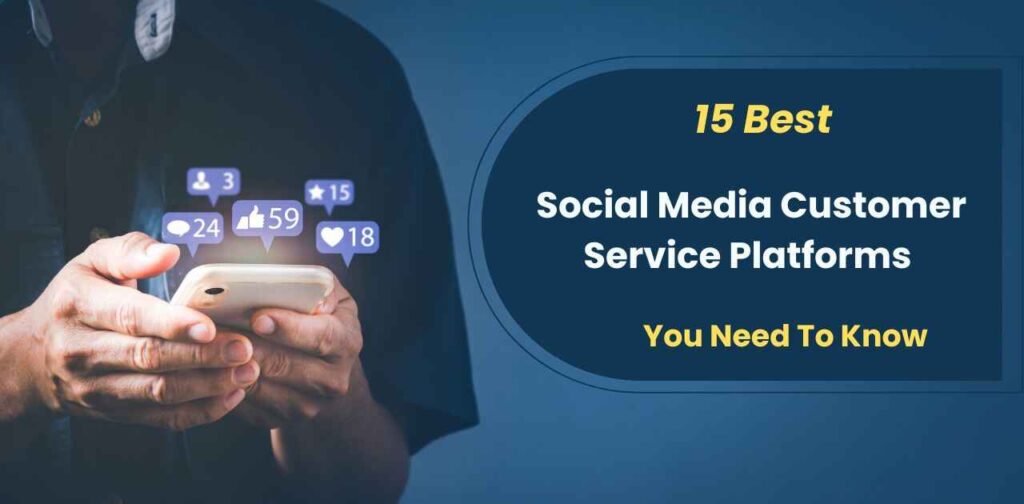
Welcome to the crème de la crème of social media customer service platforms! This list represents the best of the best for 2024, each offering unique features to supercharge your customer service game. From AI-powered analytics to seamless omnichannel support, these platforms are designed to help businesses of all sizes deliver stellar customer experiences on social media. Whether you’re a small startup or a large enterprise, you’re sure to find a platform here that fits your needs and helps you turn your social media channels into powerful customer service tools.
1. Saufter.io
Saufter.io is like the Swiss Army knife of social media customer service platforms. It’s packed with features that make handling customer queries a breeze. With its robust ticketing system, you can easily track and manage customer issues from start to finish.
But what really sets Saufter.io apart is its AI-powered analytics. It’s like having a crystal ball that shows you trends in customer behavior and sentiment. This allows you to proactively address issues before they become problems.
Pros:
- Comprehensive analytics and reporting
- Seamless integration with multiple social platforms
- AI-powered insights for proactive customer service
Cons:
- Steep learning curve for new users
- Higher price point compared to some competitors
2. eDesk
eDesk is the platform you turn to when you want to turn chaos into order. It excels at organizing and filtering incoming messages, making it easier for your team to prioritize and respond to customer queries.
Think of eDesk as your personal social media traffic controller. It directs messages to the right team members, ensuring that no customer query gets lost in the shuffle. Plus, its integration with e-commerce platforms makes it a favorite among online retailers.
Pros:
- Excellent message organization and filtering
- Strong e-commerce integration
- User-friendly interface
Cons:
- Limited advanced analytics compared to some competitors
- Some users report occasional glitches in social media integration
3. Conversocial
Conversocial is all about turning social media interactions into meaningful conversations. It’s like having a skilled diplomat on your team, helping you navigate tricky customer interactions with ease.
What sets Conversocial apart is its focus on AI-powered automation. It can handle a significant portion of customer queries automatically, freeing up your human agents to deal with more complex issues. This is particularly useful for businesses dealing with high volumes of similar queries.
Pros:
- Strong AI-powered automation
- Excellent for handling high volumes of queries
- Advanced sentiment analysis
Cons:
- Can be complex to set up and configure
- Some users find the interface less intuitive than other platforms
4. Sprout Social
Sprout Social is like the cool kid on the block when it comes to social media management and customer service. It offers a comprehensive suite of tools that cover everything from publishing content to responding to customer queries.
What makes Sprout Social stand out is its Smart Inbox feature. It’s like having a super-intelligent sorting hat that categorizes and prioritizes incoming messages across all your social channels. This makes it easier for your team to respond quickly and effectively to customer queries.
Pros:
- Comprehensive social media management tools
- Excellent analytics and reporting features
- User-friendly interface
Cons:
- Can be pricey for smaller businesses
- Some advanced features have a steep learning curve
5. Zoho Desk
Zoho Desk is the platform you turn to when you want to create a seamless omnichannel support experience. It’s like having a universal translator that helps you communicate with customers across all channels social media, email, chat, you name it.
What sets Zoho Desk apart is its AI assistant, Zia. Zia can help your team by suggesting responses, automating routine tasks, and even predicting customer satisfaction. It’s like having a super-smart intern who never needs coffee breaks!
Pros:
- Strong omnichannel support capabilities
- AI-powered assistant for improved efficiency
- Excellent integration with other Zoho products
Cons:
- Can be overwhelming for businesses with simple needs
- Some users report occasional performance issues
6. Sparkcentral
Sparkcentral is all about bringing the human touch to digital conversations. It’s designed to help your team have more meaningful, personalized interactions with customers on social media.
What makes Sparkcentral unique is its focus on asynchronous messaging. This means customers can start a conversation, go about their day, and come back to continue it later just like they do with their friends. It’s like bringing the comfort of WhatsApp conversations to customer service.
Pros:
- Excellent for asynchronous messaging
- Strong focus on personalized interactions
- Good integration with popular messaging platforms
Cons:
- Limited features for social media content management
- Some users find the analytics less comprehensive than other platforms
7. Front
Front is the platform you choose when you want to turn your customer service team into a well-oiled machine. It’s designed to streamline communication not just with customers, but within your team as well.
What sets Front apart is its unique approach to email management. It turns your team inbox into a collaborative workspace, allowing team members to work together on customer queries seamlessly. It’s like having a virtual war room where your team can strategize and tackle customer issues together.
Pros:
- Excellent for team collaboration
- Seamless integration of email and social media communication
- Clean, intuitive interface
Cons:
- Primarily focused on email, with social media as a secondary feature
- Can be pricey for larger teams
8. Salesforce Digital Engagement
Salesforce Digital Engagement is the heavyweight champion of customer relationship management. It’s part of the larger Salesforce ecosystem, which means it can tap into a vast array of customer data and insights.
What makes Salesforce Digital Engagement stand out is its ability to create a unified view of the customer across all touchpoints. It’s like having X-ray vision that lets you see every interaction a customer has had with your brand, whether it’s a purchase, a support ticket, or a social media comment.
Pros:
- Comprehensive customer view across all channels
- Powerful analytics and reporting capabilities
- Seamless integration with other Salesforce products
Cons:
- Can be complex and overwhelming for smaller businesses
- Requires significant investment in terms of time and resources to set up and maintain
9. Sprinklr
Sprinklr is the platform you turn to when you want to take your social media customer service to the next level. It’s a comprehensive solution that covers everything from social listening to customer care.
What sets Sprinklr apart is its AI-powered insights. It can analyze vast amounts of social media data to help you understand customer sentiment, spot emerging trends, and identify potential issues before they blow up. It’s like having a crystal ball that shows you the future of your customer relationships.
Pros:
- Powerful AI-driven insights
- Comprehensive suite of social media management tools
- Excellent for large enterprises with complex needs
Cons:
- Can be overwhelming for smaller businesses
- Significant learning curve to utilize all features effectively
10. LiveAgent
LiveAgent is the Swiss Army knife of customer service platforms. It’s designed to handle everything from social media interactions to live chat, email, and even phone support.
What makes LiveAgent stand out is its universal inbox feature. It brings all customer communications into a single place, making it easier for your team to manage and respond to queries. It’s like having a super-organized digital filing cabinet where you can find any customer interaction in seconds.
Pros:
- Comprehensive omnichannel support capabilities
- User-friendly interface
- Affordable pricing for small to medium businesses
Cons:
- Some users report occasional glitches with social media integration
- Advanced features can have a learning curve
11. Gladly
Gladly takes a unique approach to customer service by focusing on people, not tickets. It’s designed to give your team a holistic view of each customer, regardless of which channel they’re using to communicate.
What sets Gladly apart is its emphasis on creating a seamless conversation across all channels. A customer can start a conversation on Twitter, continue it via email, and finish it with a phone call and your team will see it all as one continuous thread. It’s like having a magical notebook that automatically organizes all your customer interactions.
Pros:
- People-centered approach to customer service
- Seamless omnichannel conversation threading
- Excellent for creating personalized customer experiences
Cons:
- Can be pricey for smaller businesses
- Some users find the interface less intuitive than other platforms
12. Zendesk
Zendesk is a household name in the world of customer service platforms, and for good reason. It offers a comprehensive suite of tools that can handle everything from social media interactions to complex help desk scenarios.
What makes Zendesk stand out is its flexibility and customizability. It’s like a set of LEGO bricks that you can use to build the exact customer service solution you need. Whether you’re a small startup or a large enterprise, Zendesk can scale to meet your needs.
Pros:
- Highly customizable and flexible
- Comprehensive suite of customer service tools
- Excellent integration with a wide range of third-party apps
Cons:
- Can be complex to set up and configure
- Pricing can add up quickly as you add more features
13. Freshdesk
Freshdesk is the platform you choose when you want a no-nonsense, straightforward approach to customer service. It offers a robust set of features wrapped in a user-friendly interface.
What sets Freshdesk apart is its gamification features. It turns customer service into a fun, engaging activity for your team. Agents can earn points, unlock achievements, and compete with each other. It’s like turning your customer service department into a video game where everyone wins including your customers!
Pros:
- User-friendly interface
- Engaging gamification features
- Affordable pricing for small to medium businesses
Cons:
- Some advanced features are only available in higher-tier plans
- Some users report limitations in customization options
14. Hootsuite
Hootsuite is primarily known as a social media management platform, but it also packs a punch when it comes to customer service features. It’s like the Swiss Army knife of social media tools it can do a bit of everything.
What makes Hootsuite stand out for customer service is its powerful social listening capabilities. It can help you monitor mentions of your brand across various social platforms, even when you’re not directly tagged. This allows you to proactively address customer issues and join relevant conversations. It’s like having a super-sensitive ear that can hear every whisper about your brand across the social media landscape.
Pros:
- Excellent social media management features
- Strong social listening capabilities
- Good for businesses that prioritize proactive customer service
Cons:
- Customer service features are not as comprehensive as dedicated platforms
- Can be complex for users who only need basic customer service tools
15. Hiver
Hiver takes a unique approach to customer service by transforming Gmail into a powerful help desk. It’s perfect for businesses that heavily rely on email for customer communication.
What sets Hiver apart is its seamless integration with Gmail. If your team is already comfortable with Gmail, they’ll find Hiver intuitive and easy to use. It adds features like shared inboxes, email assignment, and collision detection right into the Gmail interface. It’s like supercharging your email with customer service superpowers!
Pros:
- Seamless integration with Gmail
- Easy to learn for teams already using Gmail
- Good for businesses that primarily use email for customer service
Cons:
- Limited features for social media customer service
- May not be suitable for businesses that need comprehensive omnichannel support
How to Choose the Right Platform for Your Business
Choosing the right social media customer service platform is like finding the perfect pair of shoes it needs to fit just right. Here are some key factors to consider:
- Your business size and needs: Are you a small business handling a few dozen queries a day, or a large enterprise dealing with thousands? Different platforms are better suited for different scales of operation.
- Channels you need to cover: Which social media platforms do your customers use most? Ensure the platform you choose supports all these
- Integration capabilities: Consider how well the platform integrates with your existing tools, like your CRM or e-commerce system. Seamless integration can save you a lot of headaches down the road.
- Budget: While it’s important to invest in good customer service, make sure the platform fits within your budget. Remember to factor in not just the initial cost, but also ongoing fees and potential costs for scaling up.
- Ease of use: A platform with all the bells and whistles isn’t much use if your team finds it too complicated. Look for a solution with an intuitive interface and good training resources.
- Analytics and reporting: Good data can help you continually improve your customer service. Ensure the platform offers robust analytics that align with your key performance indicators.
- Scalability: Think about your future needs. Can the platform grow with your business, or will you need to switch to a new system in a year or two?
- Customer support: Last but not least, consider the level of support offered by the platform provider. When you’re having issues, you’ll want responsive and helpful support.
Remember, there’s no one-size-fits-all solution. Take the time to assess your specific needs and try out a few options before making your decision. Many platforms offer free trials take advantage of these to get a feel for what works best for your team.
Future Trends in Social Media Customer Service
As we look ahead, several exciting trends are shaping the future of social media customer service. Let’s peek into our crystal ball:
- AI and Machine Learning: These technologies are set to become even more sophisticated. Expect chatbots that can handle increasingly complex queries and AI that can predict customer needs before they even reach out.
- Video Support: With the rise of platforms like TikTok and Instagram Reels, video-based customer support is likely to become more prevalent. Imagine sending a quick video tutorial to solve a customer’s problem!
- Augmented Reality (AR): AR could revolutionize how we provide visual support. For example, a customer could use their phone camera to show a product issue, and support agents could overlay instructions or highlight parts directly on the customer’s screen.
- Voice-Based Social Media: As voice assistants become more popular, we might see a rise in voice-based social media interactions. This could lead to new challenges and opportunities in customer service.
- Hyper-Personalization: With advances in data analytics, expect customer service to become even more personalized. Platforms might be able to tailor responses based on a customer’s past behavior, preferences, and even current mood.
- Proactive Service: Rather than waiting for customers to reach out with problems, more businesses will use social listening tools to identify and address potential issues before they escalate.
- Integration of Customer Service and Marketing: The line between customer service and marketing on social media is likely to blur further. Every interaction will be seen as an opportunity to not just solve problems, but also to reinforce brand values and potentially upsell.
- Blockchain for Trust and Transparency: Blockchain technology could be used to create verifiable records of customer interactions, helping to build trust and resolve disputes.
As these trends evolve, social media customer service platforms will need to adapt and innovate. The most successful platforms will be those that can stay ahead of the curve, integrating new technologies and approaches to help businesses provide stellar customer service in an ever-changing digital landscape.
In Closing
Social media customer service is a big deal these days. Customers want quick help on platforms they use every day. But keeping up can be tough for businesses. That’s where special tools come in handy. These platforms help you manage messages, respond faster, and keep customers happy.
The article talks about 15 top platforms for 2024. Each has its own cool features, like AI chatbots, smart analytics, and ways to handle messages from different social networks in one place. Whether you’re a small business or a big company, there’s likely a platform that fits your needs. The future looks exciting too, with new tech like AR and voice support on the horizon.
